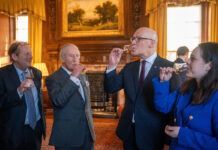Scottish is increasingly seen as a byword for quality in drinks

AS far back as the 18th century famed French writer Voltaire was declaring “we look to Scotland for all our ideas of civilisation”.
While there may have been low points in national pride o’ worth between the country’s era of enlightenment and the Alba of present day, the word Scottish is now generally being translated as a sign of quality and heritage by consumers of our nation’s drinks.
It’s providing the country’s drinks brands with a unique marketing edge – something they can rely on as an indicator of quality.
And whether that marketing is a light-hearted play on the zanier aspects of Scottish culture or a serious take on the traditions of the nation’s produce, it has created some great results for manufacturers and licensees alike.
“For us, our Scottish credentials are crucial to the development of our brand and we continue to see a real thirst for this on channels like social media,” said Neil Boyd of Ian Macleod Distillers.
“At Edinburgh Gin, we are endlessly inspired by Scotland’s extensive history of gin-making. Our brand’s Scottish credentials have informed our past, sparked our present and will shape our future.”
Martin Murray at Dunnet Bay Distillers stated that it makes particular use of its location in the north of Scotland when marketing its drinks.
“We are proud of where our gin is distilled and bottled, and I believe it is an important part of our brand,” said Murray.
“We use the wonderful imagery and stories from our local area to promote the products.”
Our Scottish credentials are crucial to the development of our brand.
Despite being a new entrant to the market Finnieston Distillery Company, which produces ready-made whisky cocktails in cans, said its Scottish provenance is “extremely important”.
The Glasgow company’s chief executive, James Doig, said: “Our products are Scotch Whisky Association approved.
“We use the term ‘Scotch whisky cocktail’ throughout our marketing campaigns so people are aware we are the real deal.
“Despite being undeniably different, we respect the whisky traditions too.”
Beer giant Tennent’s has often leaned on key aspects of Caledonian culture in its marketing campaigns.
Customer marketing manager Fi Leonard said: “Tennent’s has a unique understanding and ability to capture what it means to be Scottish.
“Whether it’s tapping into Scotland’s passion for football as partner of the Scotland national team and running cheeky stunts like our currency exchange activity on the day of the most recent Scotland England clash, or our Wimbledon away video – which showed how we would help the Tartan Army get to SW19 to cheer on Andy Murray as he attempted to win Wimbledon – our marketing is Scottish through and through.”
It is fundamentally the quality of the spirit and the authenticity of the backstory that appeals.
Communicating with the country’s throngs of football fans, and the rough and tumble banter that goes along with them, has been a clear strategy for AG Barr when marketing Irn-Bru.
Adrian Troy, marketing director at AG Barr, said the firm “recognises the importance of promoting Irn-Bru’s core values, and aligning the brand with major Scottish activities including sponsorship of the Scottish Challenge Cup which is now known as the Irn-Bru Cup”.
Reaffirming the message that the term ‘product of Scotland’ is a sign of quality, Highland Spring’s Caroline Saunders said the mineral water’s provenance forms an important part of its brand identity.
She said: “Our brand’s name itself reflects our Scottish roots and so customers can be in no doubt of the origin of the product they are consuming.”
However, Bruichladdich’s Carl Reavey was keen to point out that, regardless of the product, quality is what’s important.
He said it is “fundamentally the quality of the spirit and the authenticity of the backstory that appeals” to customers.























